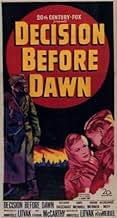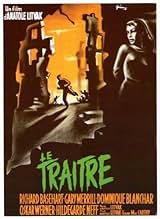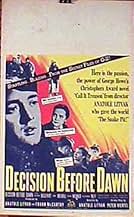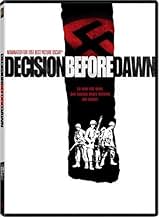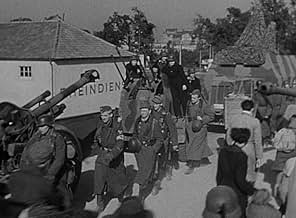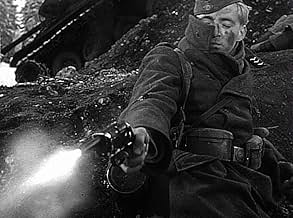AVALIAÇÃO DA IMDb
7,2/10
3,2 mil
SUA AVALIAÇÃO
Adicionar um enredo no seu idiomaAs the US Army approaches Nazi Germany, they recruit German prisoners of war to spy behind German lines.As the US Army approaches Nazi Germany, they recruit German prisoners of war to spy behind German lines.As the US Army approaches Nazi Germany, they recruit German prisoners of war to spy behind German lines.
- Direção
- Roteiristas
- Artistas
- Indicado a 2 Oscars
- 1 vitória e 4 indicações no total
Hildegard Knef
- Hilde
- (as Hildegarde Neff)
Wilfried Seyferth
- Heinz Scholtz - SS Man
- (as Wilfried Seyfert)
Robert Freitag
- Sgt. Paul Richter
- (as Robert Freytag)
Harold Benedict
- Lt. Pete Gevers
- (as H.L. Benedict S/Sgt. USAF)
H.W. Briggs
- Self
- (as H.W. Briggs Sgt. USA)
D.G. Devine
- Lt. Rennick's Driver
- (as D.G. Devine Cpl. USAF)
L.E. Dixon
- Self
- (as L.E. Dixon Maj. USA)
B.L. Hendrickson
- Self
- (as B.L. Hendrickson T/Sgt. USA)
Avaliações em destaque
Close to the end of WW2, the US military recruits Nazi defectors from the ranks of German POW's to return to Germany as spies. Klaus Kinski makes a brief appearance during the interview process, but his character is rejected. Who is accepted to participate in this mission is incomparable Oskar Werner as Corporal Karl Maurer who is given the code name Happy. It's an ironic name for such a serious actor. He's perfect for the part in this heavy film set largely in the destruction of bombed out cities. Such a setting makes it difficult for the Germans to actually capture him, as when they are on to his trail, the aerial Allied bombings begin again. There are lots of places to hide amidst the treacherous ruins of the near collapsing buildings.Yet the Germans try to maintain discipline to the very end, as a deserter is hanged and his body is left for all to see. The film uses the destruction in which it is set and reminds us of how things change when the peace time environment becomes lost amidst the destruction. Werner goes through several meetings with Germans, the best being the Colonel who orders the deserter to be hanged, and another with the tragic character played by Hildegard Knef, whom he meets in a bar. Amidst the desperation still lurks a couple of true Nazi believers, one played quite well by Wilfred Seyferth as Heinz Scholtz, a dangerous SS man who befriends the traitor Werner. The film is overwhelmingly stark and lacks any sense of humor whatsoever, but in my book that just adds to the overall effect, much like some of the Cold War era spy films, such as The Spy Who Came In From The Cold.
Having served in the US Army-Europe in Germany it was easy to see that this work was an accurate depiction of the world as Germans saw it in those years. Going to the IMDb database confirmed that it was filmed in Wurzberg, a city I visited many times. One can not help but wonder what memories and nightmares came back to life for the German people in this movie, or the ones who viewed it, or even witnessed the movie being made. The film is so very realistic in script, acting, and setting that some must have almost thought WWII was alive again. For those that lived through WWII in that country it must have seemed as if those days were repeating themselves. Every detail of this movie is accurate as far as I could tell. It does not employ overused stereotypes, no action heroes, no earth shaking grand and glorious finale, it simply depicts a period of time in all its' tragedy and irony in a most realistic manner. This work deserves more praise and exposure than it has received. A must see for every WWII researcher and historian.
10B24
Occasionally I rate a film high for personal and sentimental reasons. In this case I am compelled by objective facts to add in the light of greater perspective that I consider this one of the best war movies of all time.
In the first place, the acting is superb. The casting is flawless. The direction is taut, as is the editing. It is filmed in black and white, as it would have to be even today if someone wanted to try a remake. The locations and sets are authentic to a "T." The story itself follows faithfully the text of a book I read as a child (before I saw the film, in fact).
Moreover, I consider it an act of bravery on the part of the film's producers even to begin a project like this so soon after the end of World War II, when passions against the Germans were still running high and mere caricatures of that nation's common people remained the standard for the day (and for years to come).
Oskar Werner in the main role was a brilliant choice, and veterans Richard Basehart and Gary Merrill provide ample evidence that casting proceeded on a basis of resolute excellence and authenticity. I am still blown away by revisiting the "Romantic Road" in Germany and thinking how this movie defined and continued to define for me how recent and ancient history converged along that path.
I cannot praise it enough.
In the first place, the acting is superb. The casting is flawless. The direction is taut, as is the editing. It is filmed in black and white, as it would have to be even today if someone wanted to try a remake. The locations and sets are authentic to a "T." The story itself follows faithfully the text of a book I read as a child (before I saw the film, in fact).
Moreover, I consider it an act of bravery on the part of the film's producers even to begin a project like this so soon after the end of World War II, when passions against the Germans were still running high and mere caricatures of that nation's common people remained the standard for the day (and for years to come).
Oskar Werner in the main role was a brilliant choice, and veterans Richard Basehart and Gary Merrill provide ample evidence that casting proceeded on a basis of resolute excellence and authenticity. I am still blown away by revisiting the "Romantic Road" in Germany and thinking how this movie defined and continued to define for me how recent and ancient history converged along that path.
I cannot praise it enough.
As American forces approach Germany near the end of World War II, it becomes crucial for them to get an idea of the Germans' capacity to resist. In order to do that, they recruit spies from among German POWs, train them and send them into Germany to gather information. This is somewhat of an unusual film about a subject that, as far as I know, had never been dealt with before or since (the movie is based on fact; American military intelligence did indeed use German POWs as spies). The location filming helps the picture greatly, as the war had only been over for a few years and Germany still hadn't rebuilt yet. Performances are universally top notch, notably Oskar Werner as a young German soldier code-named Happy who volunteers to return as a spy, and especially Hans Christian Blech as Happy's tough, opportunistic, and not entirely trustworthy partner. There are some nail-biting moments, notably aboard a train when Happy and his partner come under scrutiny by a suspicious Gestapo agent. The film has a tough, gritty, dangerous look that is totally atypical of the usual 20th Century Fox gloss, and is all the better for it. Gary Merrill as the tough American officer in charge of the operation, and Richard Basehart as an American agent sent in to accompany the two German spies, also turn in first-rate performances, and director Anatole Litvak keeps the film full of twists and surprises, but it's Oskar Werner's show, and he is up to it. An excellent film and one to put on your must-see list.
The movie puts you in WWII's closing days as you watch an idealistic young German Army medic become a traitor to his country by working as a spy in order to let the war end quickly and let peace return. The movie extras are former German soldiers, and you can tell by how they wear their "rag tag" uniforms and bark out commands in German. The scenes are superb. Bombed out areas of Germany were used, and one scene in a bombed out theater is especially great. You hear the falling glass and metal structures as the Gestopo search for the soldier. It is simply a very entertaining movie that lets one ponder: What would I have done if I were in his place?
Você sabia?
- CuriosidadesOne of the first films after World War II to portray the German people--outside of the Nazi regime--in a sympathetic light.
- Erros de gravaçãoKarl is mistakenly called a corporal. The Luftwaffe uniform that he wears both in the US POW cage and while back in Germany has the rank insignia of an "Obergefreiter", specifically three winged emblems on the collar patches, plain shoulder straps and two chevrons on his left sleeve. Also when the list is checked for his name at the bridge the rank is written down as 'Gfr' (gefreiter) The ranks of Gefreiter, Obergefreiter and Stabsgefreiter (all which were partially identified by chevrons on the sleeve) were not NCOs and had no command authority over other soldiers. They were simply grades of seniority and would be more equivalent to Private First Class (PFC) in the US military. The German rank that is the closest equivalent to Corporal is Unteroffizer. Also, Karl is wearing the medical badge on his right sleeve; Luftwaffe enlisted medical personnel wore the badge on the left sleeve, while Wehrmacht (army) wore it on the right.
- Citações
Lt. Dick Rennick: [Intro narration] Of all the questions left unanswered by the last war, and probably any war, one comes back constantly to my mind. Why does a spy risk his life... for what possible reason? If the spy wins, he's ignored. If he loses, he's shot.
- ConexõesReferenced in Que Garota: Decision Before Dawn (1968)
- Trilhas sonorasAch, wie ist' möglich dann (Treue Liebe)
(uncredited)
Written by Friedrich Kücken (1827)
Principais escolhas
Faça login para avaliar e ver a lista de recomendações personalizadas
- How long is Decision Before Dawn?Fornecido pela Alexa
Detalhes
- Data de lançamento
- Países de origem
- Idiomas
- Também conhecido como
- Decisión al amanecer
- Locações de filme
- Empresas de produção
- Consulte mais créditos da empresa na IMDbPro
- Tempo de duração1 hora 59 minutos
- Cor
- Proporção
- 1.37 : 1
Contribua para esta página
Sugerir uma alteração ou adicionar conteúdo ausente

Principal brecha
By what name was Decisão Antes do Amanhecer (1951) officially released in India in English?
Responda

